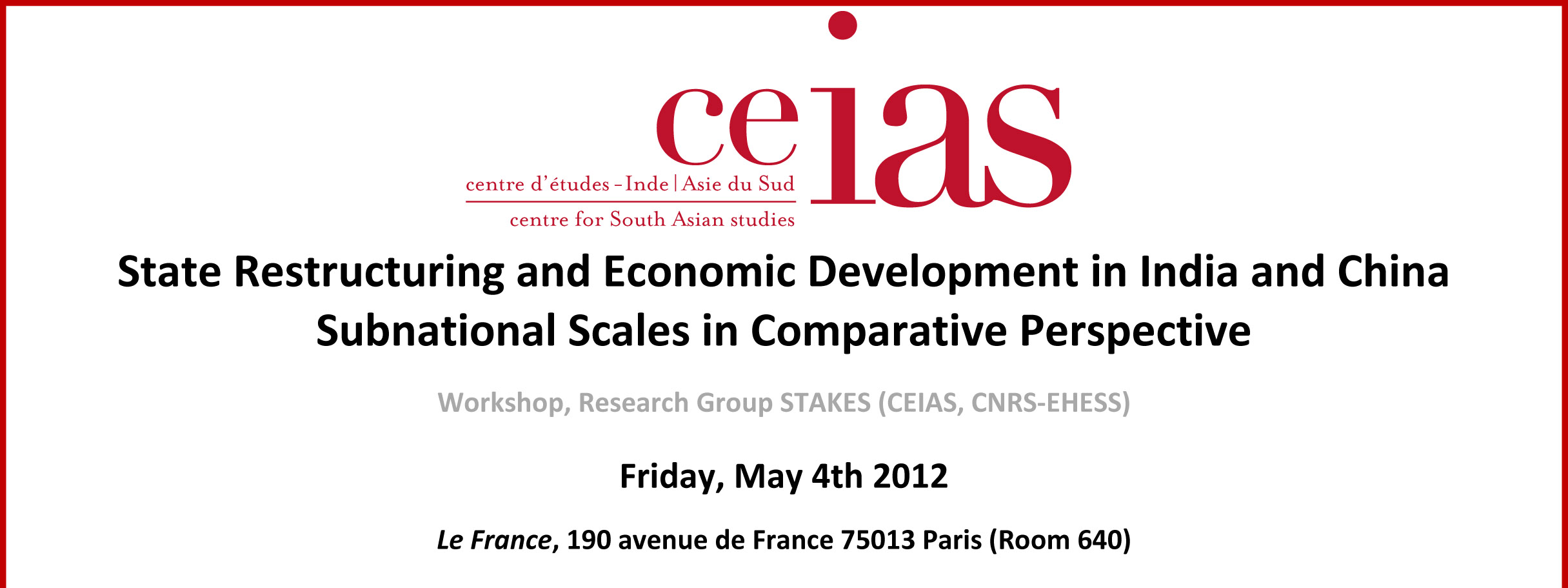Vie scientifique | Journées d'études
State Restructuring and Economic Development in India and China
Subnational Scales in Comparative Perspective
India’s gradual reform programme spanning the last 20 years has been accompanied by a process of state restructuring at all spatial scales. This process is less a consequence of deliberate delegation on the part of the central state than a secondary effect induced by changes in governance, characterized by a profound redefinition of the lines dividing the public and private spheres. The concept of state re-scaling, which is at the centre of this reflection, designates a change in the spatial frame of reference of public action (Brenner 2004). It offers a compelling framework for examining the political economy of India through a spatially sensitive lens. At the national scale, we propose to consider that national growth strategies are no longer framed to “fit” neatly with national territorial borders, rather the gradual opening of the economy has favoured strategies that aim to create competitive spaces e.g., special economic zones, industrial estates, usually in urban areas, which put subnational spaces into direct competition with each other. Likewise, political elites in some of India’s States are rescaling their territories as a strategic response to opportunities opened up by economic liberalisation, although State governments have responded in different ways to recent changes in economic environment. One of the objectives of the workshop is to analyse the modalities of state re-scaling through specific case studies and to examine the consequences of public action in different policy areas at various spatial scales (national, regional, metropolitan). We propose to engage with these issues by comparing and contrasting rescaling processes in China, where deep economic restructuring is underway and where subnational state spaces (provinces, municipalities) have emerged as critical drivers of economic development. This comparative approach will allow us to reflect on the theoretical relevance of the notion of re-scaling in emerging economies, compared to advanced industrialised countries where it has been used to understand economic restructuring in the post-fordist era.
Document(s) à télécharger
Les sites du CEIAS
- SAMAJ | The South Asia Multidisciplinary Academic Journal
- CEIAS - Facebook
- CEIAS - Twitter
- CEIAS - Newsletter
- Le Bulletin de la Bibliothèque
- Régionalisme & cosmopolitisme
- DELI | Dictionnaire Encyclopédique des Littératures de l’Inde
- DHARMA | The Domestication of “Hindu” Asceticism and the Religious Making of South and Southeast Asia
- TST | Texts Surrounding Texts
- STARS | Studies in Tamil Studio Archives and Society 1880-1980
- I-SHARE | The Indian Subcontinent’s Shared Sacred Sites
- Sri Lanka et diasporas
- Sindhi Studies Group
- Carnet du Master Études asiatiques
- Master “Asian Studies”
- Social Sciences Winter School in Pondicherry
- Caste, Land and Custom
- Musiques indiennes en terres créoles
 Actualités
Actualités
Devenir juifs : conversions et assertions identitaires en Inde et au Pakistan
 Débat - Mardi 9 mai 2023 - 14:00Présentation« L’an prochain à Jérusalem ! », scande un homme portant une kippa dans une synagogue de Karachi au Pakistan. Ses paroles sont répétées en chœur par les membres de sa communauté, un groupe comptant près de trois cents personnes qui s’autodésignent par (...)(...)
Débat - Mardi 9 mai 2023 - 14:00Présentation« L’an prochain à Jérusalem ! », scande un homme portant une kippa dans une synagogue de Karachi au Pakistan. Ses paroles sont répétées en chœur par les membres de sa communauté, un groupe comptant près de trois cents personnes qui s’autodésignent par (...)(...)
Le Centre d'études sud-asiatiques et himalayennes (Cesah), nouveau laboratoire de recherche (EHESS/CNRS) sur le Campus Condorcet
Échos de la recherche -Depuis le 1er janvier 2023, l'EHESS, en tant que co-tutelle, compte un nouveau centre de recherche né de la fusion du Centre d'études de l'Inde et de l'Asie du Sud (CEIAS - EHESS/CNRS) et du Centre d’études himalayennes (CEH - CNRS) : le Centre d'études sud-asiatiques et h (...)(...)
Centre d'Études de l'Inde et de l'Asie du Sud
UMR8564 - CNRS / EHESS
54 boulevard Raspail
75006 Paris, France
Tél. : +33 (0)1 49 54 83 94
Communication :
nadia.guerguadj[at]ehess.fr
Direction :
dir.ceias[at]ehess.fr
La bibliothèque du CEIAS
Maison de l'Asie
22 avenue du Président Wilson 75016 Paris
54 boulevard Raspail
purushartha[at]ehess.fr


